When you explore Jewish last names, you'll find that each one tells a story rooted in culture and history. Names like Cohen and Levi hint at ancient priestly lines, while others, such as Rosen and Goldberg, evoke nature and beauty. You might wonder about the significance behind Katz or Klein, which reveal unique characteristics and traditions. As you uncover these meanings, you may start to see how each name contributes to a rich tapestry of identity within the Jewish community, prompting you to consider what your own name might signify.
Cohen

Cohen is one of the most recognized Jewish last names, with its roots tracing back to the Hebrew word for "priest." If you encounter someone with this surname, they likely have ancestral ties to the priestly caste, the Kohanim, who served in the ancient Temple in Jerusalem.
As a Cohen, you might enjoy certain privileges within the Jewish community, which highlights your family's historical role.
Being part of the Kohanim means you could have specific responsibilities during religious ceremonies, such as the priestly blessing, known as Birkat Kohanim. It's a special honor, and many people take pride in this connection to their heritage.
You may also find that some synagogues have unique customs for Cohanim, like calling them first to the Torah during readings.
If you're a Cohen, you might notice that your family has certain traditions passed down through generations. These customs often help connect you to your ancestors and the rich history of the Jewish people.
Embracing your surname can deepen your understanding of your identity. So, whether you're exploring your roots or participating in community events, the name Cohen carries a legacy that's both meaningful and powerful.
Levi
Another prominent Jewish last name is Levi, which derives from the Hebrew word for "joined" or "attached." If your surname is Levi, you likely have ancestral ties to the Levites, who were designated as assistants to the priests in the ancient Temple. This name holds significant historical importance, as the Levites played a vital role in religious ceremonies, music, and other duties within the Temple.
In Jewish tradition, the Levites are seen as a special group, set apart for spiritual service. Your connection to this lineage can be a source of pride and identity. Many Levites today continue to embrace their heritage, participating in rituals that reflect their ancestral role.
Interestingly, if you're a Levi, you might've unique privileges during certain religious ceremonies, such as being called to the Torah during synagogue services. This tradition reinforces the idea of connection and community, reminding you of the importance of your roots.
Understanding the meaning behind your last name can deepen your appreciation for your family history and the rich tapestry of Jewish culture. So, take a moment to reflect on what Levi means to you and your journey!
Katz
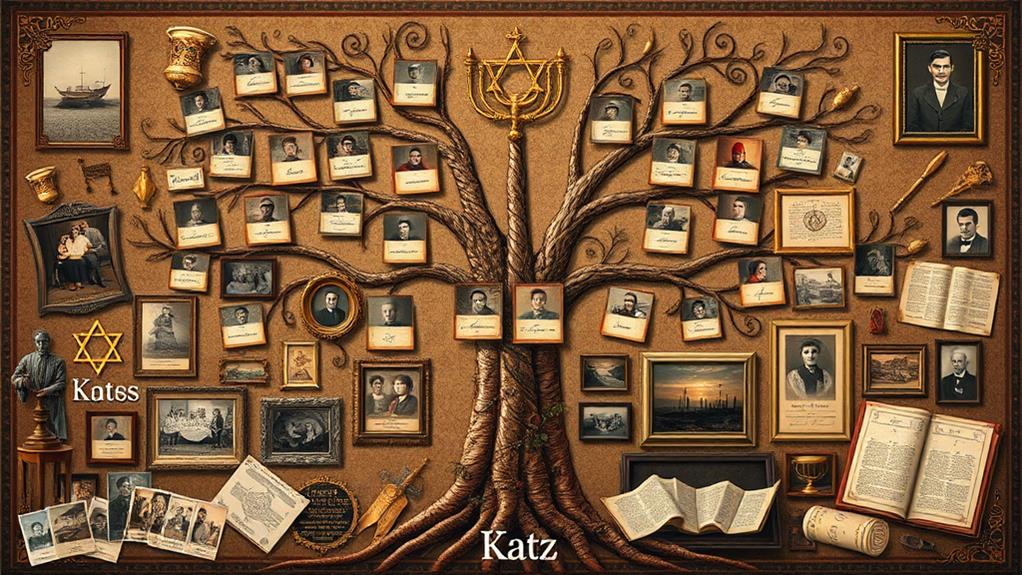
Katz is a fascinating Jewish surname that originates from the Hebrew phrase "Kohen Tzedek," meaning "priest of righteousness." If your last name is Katz, you likely have roots connected to the Kohanim, the priestly class descended from Aaron, Moses' brother. This surname carries a rich history and reflects a deep spiritual legacy within Jewish tradition.
As a Katz, you may feel a sense of pride in belonging to a lineage that has played a significant role in religious practices. Kohanim had specific duties in ancient times, including performing blessings and sacrifices at the Temple in Jerusalem.
Even today, those with the Katz surname might participate in special rituals, like the Birkat Kohanim, or the Priestly Blessing, during synagogue services.
Katz also serves as a reminder of the importance of righteousness and ethical behavior in daily life. Many individuals with this surname strive to embody these values, contributing positively to their communities.
If you're exploring your family history, you might discover stories of resilience and dedication that highlight the significance of being a Katz. Embracing this heritage can deepen your understanding of your identity and connection to Jewish culture.
Rosen
Have you ever wondered about the significance of the surname Rosen? This name, which means "rose" in German, carries a beautiful floral symbolism. In Jewish culture, roses often represent love, beauty, and honor. When you see the name Rosen, it might evoke thoughts of these lovely flowers, suggesting a connection to nature and appreciation for its elegance.
Rosen is a common surname among Ashkenazi Jews and can be traced back to the medieval period. Many families adopted surnames based on their surroundings or personal characteristics, and the rose often symbolized positivity and charm.
You might find that people with the surname Rosen have a rich cultural heritage, as this name is prevalent in various countries, including Poland and Russia.
Interestingly, the name is sometimes used as part of longer surnames, such as Rosenbaum or Rosenblatt, which add even more layers to its meaning.
If your last name is Rosen, you're part of a tradition that celebrates beauty and resilience. So next time you hear the name, you'll know there's more than just a flower behind it—there's a story waiting to bloom!
Goldberg

After exploring the beauty of the surname Rosen, it's time to uncover the meaning behind the name Goldberg. The name Goldberg is a combination of two Yiddish words: "gold," which refers to the precious metal, and "berg," meaning mountain.
So, literally, it translates to "mountain of gold." This surname often indicates a family's wealth or status during historical times.
Goldberg is quite popular among Jewish families, and you'll find it in various cultures, spreading across Europe and beyond. Many people with this surname have made significant contributions in fields like music, science, and sports, which makes it even more fascinating.
When you meet someone with the last name Goldberg, you might be encountering a proud lineage that carries a rich history and tradition. It's a name that blends heritage with a sense of pride.
Stein
Stein is a surname deeply rooted in Jewish heritage, deriving from the German word for "stone." This name often signifies strength and stability, reflecting a connection to the enduring nature of rock formations.
When you encounter the surname Stein, it's essential to recognize its historical significance. Many families with this name can trace their ancestry back to various regions in Europe, particularly Germany and Austria.
The name Stein has been adopted by countless individuals who take pride in their heritage. You might find that many Steins have excelled in various fields, including science, the arts, and business, showcasing the determination and resilience often associated with this name.
In Jewish tradition, names often hold profound meanings and can reflect personal or familial histories. If your last name is Stein, you might feel a strong connection to these qualities of strength and perseverance.
You may also appreciate how the name has been passed down through generations, symbolizing a legacy that continues to thrive. Overall, Stein is more than just a last name; it embodies a rich tapestry of culture, identity, and pride.
Schwartz
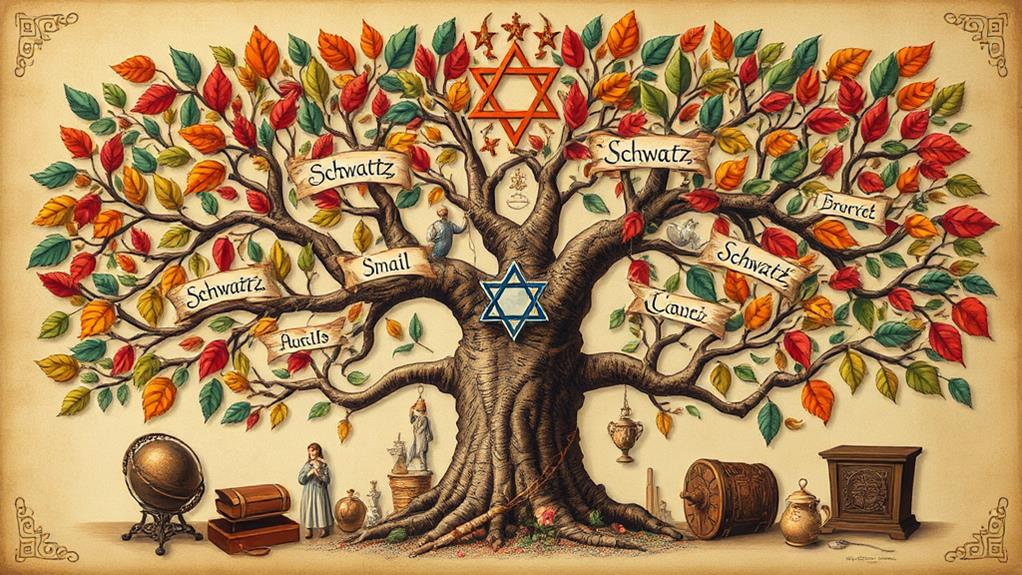
Schwartz is a surname that represents a rich cultural heritage, translating to "black" in German. This name has deep roots in Jewish history, often associated with individuals who lived in regions where they might've had dark hair or complexions.
You might find that many families with the surname Schwartz trace their ancestry back to Eastern Europe, particularly in countries like Poland and Russia. The name can also serve as a reminder of the diverse backgrounds within Jewish communities.
Schwartz is often found in various forms, like Schwartzman or Schwartzberg, which can indicate family ties or geographical connections. When you come across someone with this name, you're likely encountering a person with a proud lineage that celebrates their Jewish identity.
Interestingly, Schwartz has also made its way into popular culture, appearing in books, movies, and even television shows. This surname not only connects people to their heritage but also fosters a sense of belonging within the broader Jewish community.
If you ever meet someone named Schwartz, you can appreciate the rich history and meaning that come with their name.
Friedman
Friedman is often associated with families who were involved in trades or professions that brought happiness, such as merchants or entertainers.
Over the years, this surname has spread across many countries, especially in Eastern Europe and the United States. You might find the name among various communities, showcasing its wide appeal.
In popular culture, the name Friedman appears in various contexts, from literature to notable historical figures.
If you meet someone with this surname, you might be talking to someone with a rich heritage and a family history steeped in joy.
Understanding the meaning behind names like Friedman helps you appreciate the depth of Jewish culture and the stories that come with each surname.
Kaplan

Kaplan is a surname that often signifies a connection to the role of a rabbi or a spiritual leader, derived from the Hebrew word for "priest." This name has historical roots in Jewish communities, particularly in Eastern Europe, where it was commonly adopted by families with religious significance.
As you explore the name, you'll discover that Kaplan symbolizes not just a profession, but a deep respect for spiritual guidance and community leadership.
In many cases, those with the Kaplan surname may have ancestors who served as respected figures within their communities, providing help and wisdom to others. This lineage often creates a sense of pride, as it connects individuals to a rich heritage of faith and tradition.
If you meet someone named Kaplan, you might find they've a strong appreciation for their cultural background, and they may even share stories about their family's role in religious life.
The Kaplan name is also recognized beyond religious contexts, as it appears in various professions and areas of expertise.
This versatility showcases the adaptability of those who carry the name, blending tradition with modern life, and highlighting the enduring legacy of their ancestors.
Weiss
Weiss is a surname that translates to "white" in German and Yiddish, symbolizing purity or brightness. This name often reflects a connection to the cultural and historical significance of color in Jewish traditions. In many ancient societies, the color white represented clarity and innocence, which might explain why families chose this name.
If you've encountered the name Weiss, you might notice it appears in various forms across Europe, showcasing its widespread appeal. You may find that people with this surname often have roots in Germany or Eastern Europe, where Jewish communities thrived for centuries.
Some famous individuals with the surname include notable figures in arts, sciences, and sports, signifying the name's versatility and prominence.
The name Weiss is also linked to various Jewish customs and practices. For instance, during certain holidays, wearing white garments symbolizes purity and a fresh start.
Cohen-Tsuker
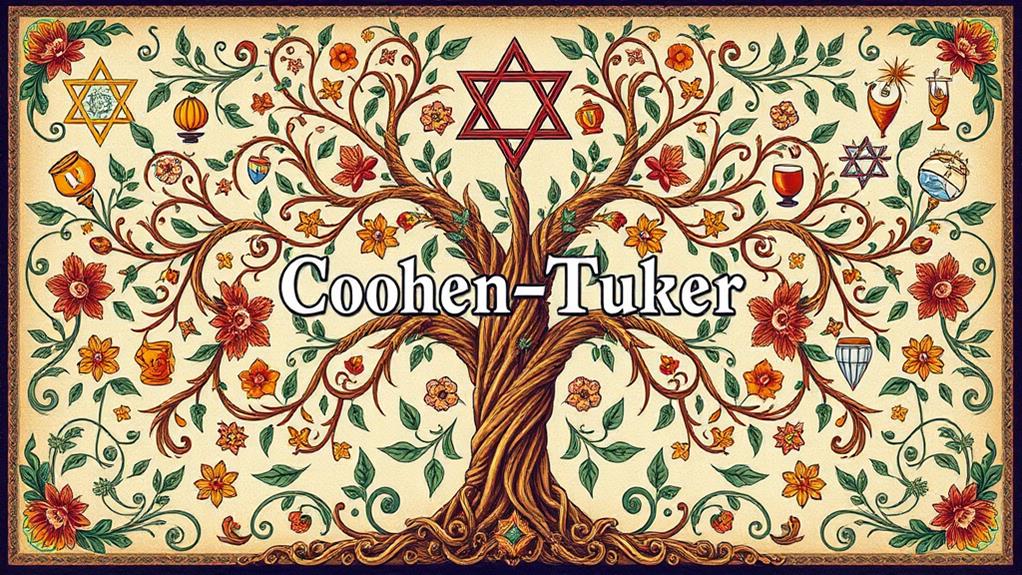
Cohen-Tsuker is a surname that blends two significant elements of Jewish heritage, reflecting both a priestly lineage and a connection to the name Tsuker, which means "sugar" in Yiddish.
When you hear the name Cohen, you might think of the ancient priests known as Cohanim, who played a vital role in the Temple of Jerusalem. This lineage is respected and carries traditions that continue today.
The addition of Tsuker adds a sweet twist to the name, linking it to the culinary world. Sugar has always been an essential ingredient in Jewish cuisine, often used in festive dishes during celebrations and holidays.
So, when you come across someone with the surname Cohen-Tsuker, you're not just looking at a name; you're exploring a rich tapestry of cultural history.
Names like Cohen-Tsuker remind us of the importance of heritage and the stories behind our identities. Each part of the name carries meaning, connecting families to their roots and traditions.
Whether you're learning about Jewish surnames for school or simply out of curiosity, names like Cohen-Tsuker serve as a delightful entry point into understanding a vibrant culture.
Greenberg
Greenberg is another surname that carries significant meaning within the Jewish community, often associated with nature and the beauty of the environment. The name itself combines "green," which symbolizes life, growth, and renewal, with "berg," meaning mountain or hill. You can see how this name reflects a deep connection to the natural world.
Many people with the surname Greenberg may have ancestors who lived in areas rich in greenery, such as lush hills or fertile valleys. This connection to nature isn't just a coincidence; it reflects a larger cultural appreciation for the environment in Jewish tradition.
Nature often plays a vital role in Jewish teachings, emphasizing harmony and stewardship. If you meet someone named Greenberg, you might find them to be passionate about preserving nature or involved in community efforts to protect the environment.
It's fascinating how a simple last name can carry such a rich history and significance. So, whether you're exploring your own heritage or just curious about names, Greenberg serves as a beautiful reminder of the bond between people and the natural world.
Adler

Adler is a surname that holds a significant place in Jewish culture, often symbolizing strength and resilience. Originating from the German word for "eagle," it represents qualities like power and nobility. When you hear the name Adler, think of the majestic eagle soaring high in the sky, a fitting metaphor for the tenacity of those who bear this name.
You might find that the name Adler has historical roots in various regions, including Eastern Europe and Germany. Many families with this surname can trace their lineage back to proud ancestors who faced challenges with courage.
Throughout history, Adlers have made notable contributions in diverse fields like art, science, and politics, showcasing their determination and creativity.
If you encounter someone with the last name Adler, you're likely meeting a person who values tradition and strength. The eagle, a powerful symbol in Jewish culture, reflects a connection to heritage and a commitment to overcoming obstacles.
Understanding the significance of the Adler surname can deepen your appreciation for its rich history and the resilient spirit of those who carry it forward. So, next time you come across this name, you'll know it stands for something truly remarkable!
Rubin
Rubin, a surname that resonates with richness and depth, is derived from the Hebrew word for "behold, a son." This name often symbolizes hope and renewal, reflecting the joy of new beginnings. When you hear the name Rubin, think of a legacy that carries significance through generations. Many families with this surname cherish its meaning, as it connects them to their heritage.
People with the last name Rubin can be found in various professions, showcasing their talents and contributions to society. You might encounter Rubins in fields such as art, music, and business, where they often leave a lasting impact. The name has roots in Jewish history, reminding us of the importance of family and community ties.
Interestingly, the Rubin name has variations in many cultures, illustrating its widespread appeal. You may find similar last names that also carry meanings related to strength and resilience.
Shapiro
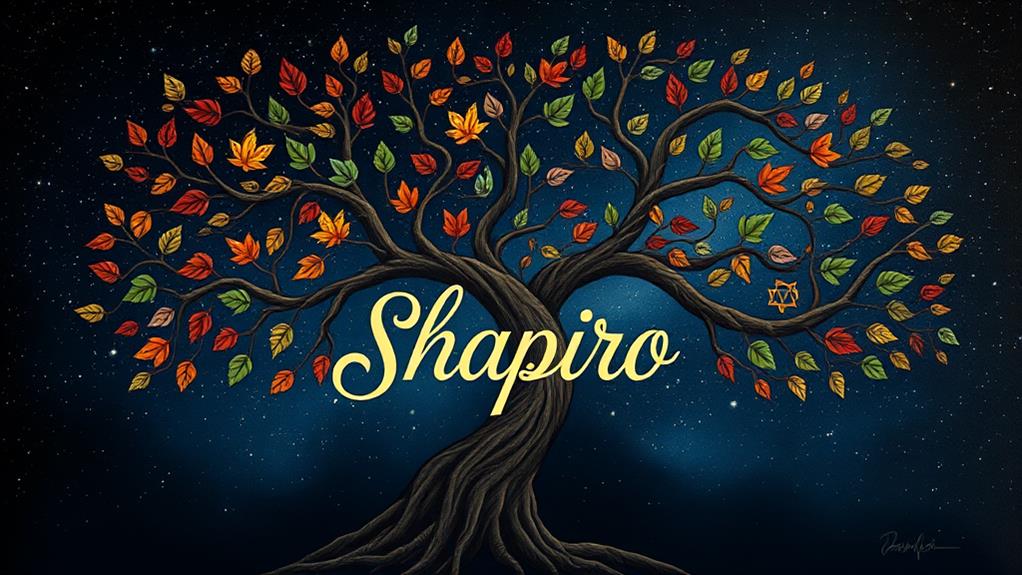
Another prominent Jewish surname is Shapiro, which carries a rich history and significance. You might be curious about its origins. The name Shapiro is derived from the Hebrew "shapir," meaning "beautiful" or "handsome." It's a name that reflects pride and heritage, often associated with the Jewish communities of Eastern Europe.
If you dig a little deeper, you'll find that Shapiro can also trace its roots to the city of Speyer in Germany, known in Hebrew as "Shapira." This connection highlights the name's long-standing presence in Jewish history, as many families migrated over the centuries, carrying their names with them to new lands.
The Shapiro surname is quite common, and you may encounter many individuals with this last name today. Notable figures, including artists, musicians, and scholars, have proudly carried the Shapiro name, contributing to various fields and enriching cultural life.
Understanding names like Shapiro helps you appreciate the rich tapestry of Jewish culture and the stories behind each name. Whether you're meeting someone with this surname or researching your own lineage, the Shapiro name represents a vibrant legacy worth celebrating.
Klein
Klein is a surname that many people might recognize, and its meaning adds depth to its significance. Originating from German and Yiddish, "Klein" translates to "small" or "little." This name often reflects a physical characteristic or could be a nickname given to someone who was shorter in stature.
Imagine walking through a historical village where people were often identified by traits that stood out—Klein would signify that someone was small but perhaps mighty in spirit!
As you explore the history of this surname, you'll find that it's quite common among Jewish communities, especially in Eastern Europe. Many Jewish families adopted last names like Klein during the 18th and 19th centuries, often due to government regulations. This choice may have been practical, emphasizing a family's characteristics or their occupation.
Klein has spread across the globe, making it a familiar name not just in Jewish circles but in various cultures. You might even meet a Klein in your neighborhood, adding a personal connection to this rich history.
Heller

Heller is a fascinating surname that carries significant historical weight. Originating from the German word "hell," which means "bright" or "light," this name often referred to someone who was a "lighter" or a person who worked with light materials. In some contexts, it could also denote a baker, linking it to the idea of light-colored bread.
You might find that Heller is common among Ashkenazi Jews, as many Jewish surnames evolved from occupations. This name reflects a connection to craftsmanship and skill, showcasing the importance of trades in Jewish culture. If you dig deeper, you'll discover that surnames like Heller often indicate a person's profession, location, or a characteristic.
Today, people with the surname Heller can be found all over the world, in places like the United States and Israel. They often celebrate their rich heritage, which connects them to a long history of resilience and adaptation.
Goldstein
Goldstein is a surname that carries a rich heritage and distinct meaning, translating to "gold stone" in German. This name often symbolizes wealth or a connection to precious materials, which was significant in many Jewish communities throughout history.
When you encounter someone with the last name Goldstein, you might think of a family that has roots in the trade of gold or other valuable goods.
Historically, surnames like Goldstein emerged in the 18th century as Jews began adopting family names due to legal requirements. This change allowed for better identification and record-keeping, especially in Europe.
The name Goldstein is quite common in Jewish communities, particularly among Ashkenazi Jews, who've a unique culture and history.
People with this surname can be found worldwide, often carrying with them a sense of pride in their ancestry.
If you meet a Goldstein, you're likely interacting with someone who values their rich family background.
This name not only reflects a connection to wealth but also serves as a reminder of the resilience and traditions that many Jewish families hold dear.
Levy
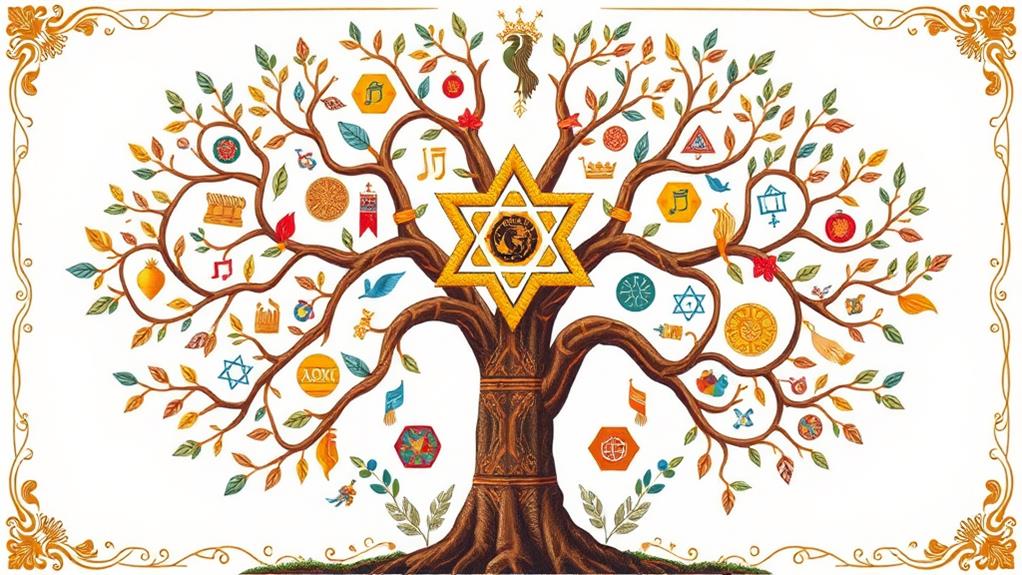
Levy is a surname that frequently appears in Jewish communities, derived from the Hebrew word "Levi," which translates to "joined" or "attached." Historically, the Levites were one of the twelve tribes of Israel, tasked with religious duties and responsibilities in the ancient Temple. If you have the surname Levy, you might feel a connection to this rich heritage.
People with the Levy surname often take pride in their ancestry, as it reflects a legacy of service and spirituality. The Levites were responsible for various important tasks, including singing, teaching, and maintaining the sacred spaces.
In many Jewish traditions, those with the Levy surname are often given honorific roles during religious ceremonies, showcasing their special status within the community.
In modern times, you'll find many individuals with the Levy surname across the globe, contributing to various fields like arts, science, and business. This name can also be spelled in different ways, such as Levine or Levi, but they all share that shared heritage.
Horowitz
Another prominent surname in Jewish culture is Horowitz, which has its roots in the historical town of Horovice in the Czech Republic. This name carries significant meaning, often associated with individuals who were part of the community there. Many people with the surname Horowitz can trace their ancestry back to this region, reflecting a rich cultural heritage.
You'll often find that the name has variations, such as Horovitz or Horovitzky, which can depend on the specific family lineage or the region they settled in. The name itself typically conveys a sense of pride in one's origins, linking the bearer to a long-standing tradition.
In Jewish history, Horowitz families often played essential roles in their communities, contributing to commerce, education, and religious life. If you meet someone with this surname, you might discover fascinating stories about their family's journey through time, showcasing resilience and adaptability.
Horowitz is more than just a name; it represents a connection to history, culture, and shared experiences.
Mandel

The surname Mandel springs from the Yiddish word for "almond," symbolizing both sweetness and a connection to nature. This name carries a rich cultural significance, often associated with warmth and hospitality.
If you're exploring Jewish heritage, you'll find that many surnames like Mandel highlight traits valued in Jewish communities, such as kindness and a love for family.
Traditionally, surnames evolved from occupations, locations, or personal characteristics. In this case, the almond represents not just a nut, but also a source of nourishment and comfort. You might come across Mandel families known for their culinary talents, especially in baking, where almonds often shine in recipes.
Additionally, the name Mandel can be found in various regions, reflecting the diverse history of Jewish migration.
Whether you're tracing your ancestry or simply curious, understanding the meaning behind the name can deepen your appreciation of your heritage.
Eisenberg
You might be intrigued to learn that the surname Eisenberg derives from the German words for "iron" (Eisen) and "mountain" (Berg), evoking images of strength and stability. This surname is often associated with Jewish families, particularly those who may have roots in German-speaking regions.
Eisenberg reflects a connection to the natural world, suggesting that families with this name might've lived near mountainous areas rich in iron deposits.
As you explore the history of the Eisenberg surname, you'll find that it carries a sense of resilience. The imagery of iron and mountains symbolizes both durability and endurance, qualities that many families proudly embody.
In Jewish tradition, names often hold significant meaning, connecting individuals to their heritage and culture.
People with the surname Eisenberg may have ancestors who were involved in various trades, including metalworking or mining, which aligns with the meaning of their name.
Today, you might encounter many Eisenbergs in diverse fields, showcasing the adaptability and strength that the name represents.
Whether you're reading about famous Eisenbergs or meeting someone with the name, you can appreciate the rich history and meaning behind it.
Ben-Ami

Originating from Hebrew, the surname Ben-Ami translates to "son of my people," reflecting a deep sense of identity and connection to one's heritage. This name is often seen as a badge of honor, emphasizing the bond between individuals and their communities.
When you hear "Ben-Ami," you might think of someone who values family ties and cultural roots.
In Jewish tradition, names carry profound meanings, and Ben-Ami is no exception. It signifies not just lineage, but also a sense of belonging. People with this surname often feel a strong connection to their ancestry, celebrating their Jewish identity through various means, such as traditions, customs, and communal activities.
You might also notice that Ben-Ami can be used as a first name, further highlighting the importance of identity in Jewish culture. The name can serve as a reminder to cherish and uphold one's heritage, fostering pride and unity among families and communities.
Katzman
Often found in Jewish communities, the surname Katzman carries significant meaning related to its roots. The name Katzman is derived from the Hebrew acronym "Kohen Tzedek," meaning "priest of justice." This connection reflects a lineage tied to the priestly class, known as the Kohanim, who've special religious roles in Judaism.
If you come across someone with the last name Katzman, you might be looking at a descendant of these ancient priests. Families with this name often take pride in their heritage, celebrating traditions that have been passed down through generations.
Katzman can also be a reminder of the importance of justice and righteousness in life. This surname isn't just a name; it represents a rich history and a commitment to values that many hold dear.
In some cases, variations like Katz may appear, but they all share that same noble origin.
Berenbaum

While surnames like Katzman highlight connections to the priestly class, the surname Berenbaum carries its own unique significance within Jewish heritage.
It's derived from the Yiddish words "beren," meaning "bear," and "baum," meaning "tree." Essentially, Berenbaum can be translated to "bear tree," which evokes images of strength and stability.
You might find it interesting that the bear is often associated with bravery in Jewish folklore, symbolizing protection and resilience. Families with the surname Berenbaum may have originally been named for their connection to nature or perhaps even a specific location known for bears or trees.
Throughout history, individuals with the Berenbaum surname have made notable contributions to various fields, including science, arts, and politics.
By carrying this name, you're embracing a legacy that reflects both strength and a deep connection to nature.
If you have this surname, it's a badge of honor, linking you to a rich cultural heritage.
Understanding these meanings can deepen your appreciation for your ancestry and inspire you to share these stories with others.
After all, every name tells a story, and Berenbaum is no exception!
